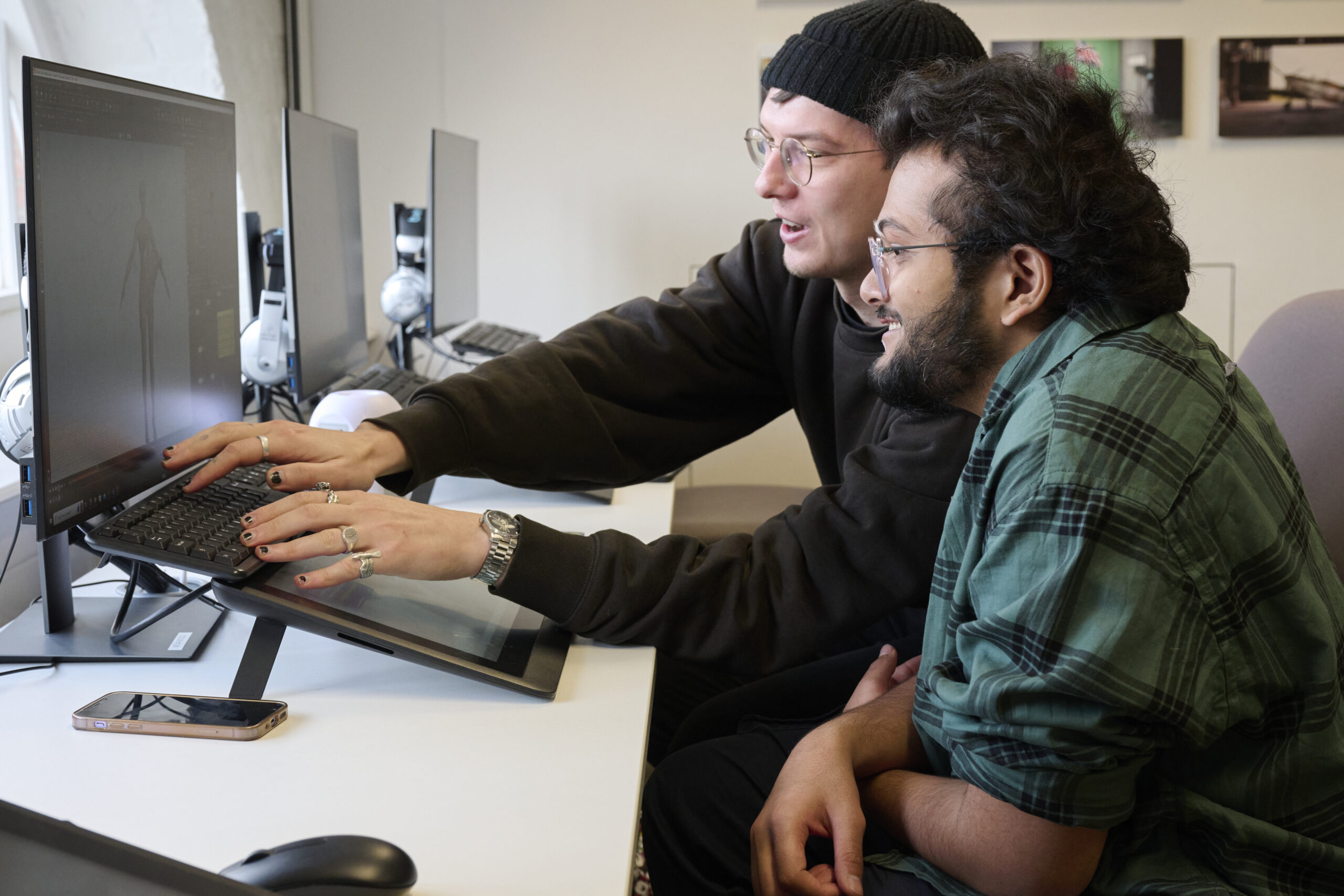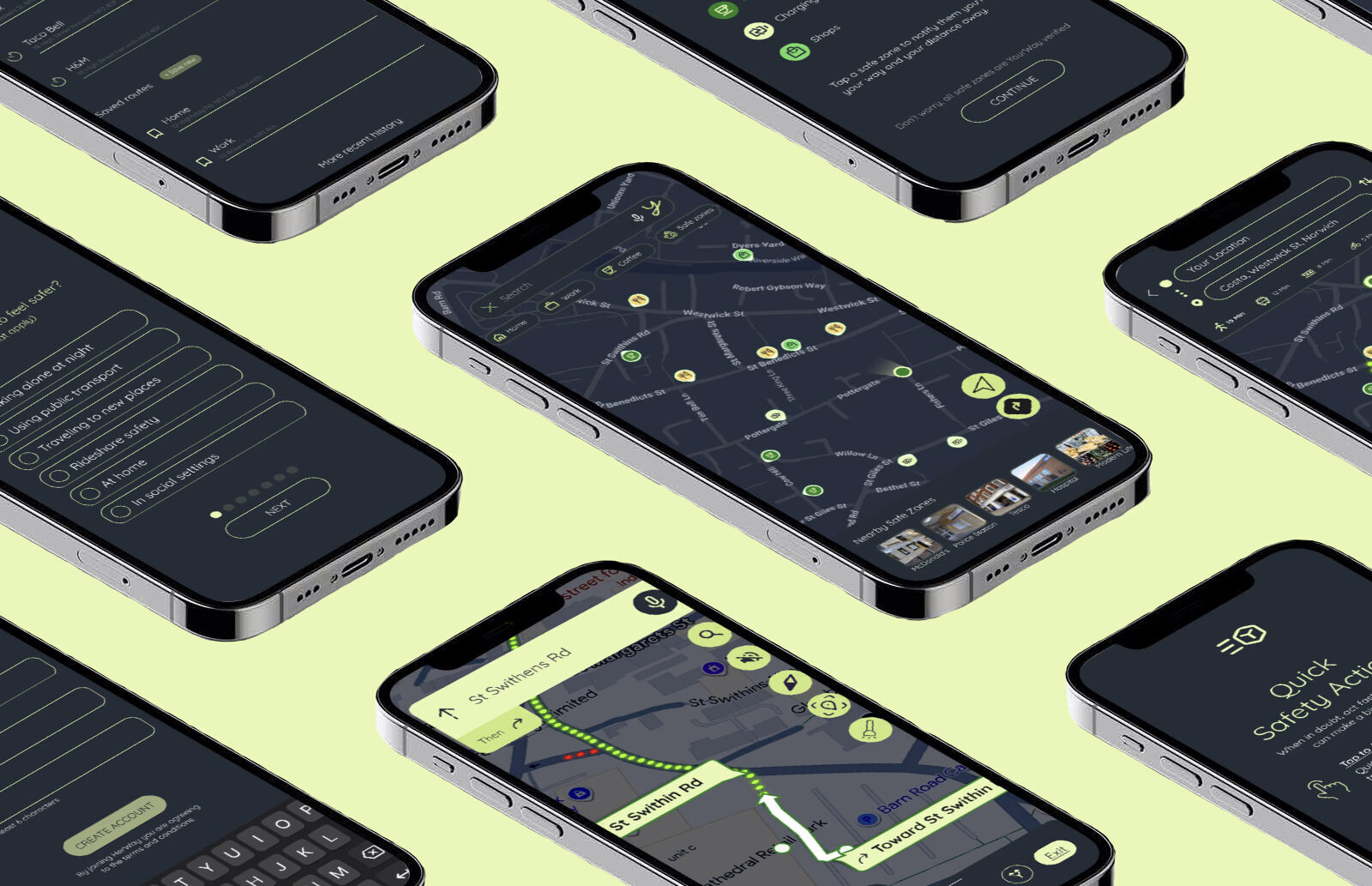
Psychology BSc (Hons)
Explore and understand why people think, feel, and behave as they do.
-
Course Duration
3 Years
-
Annual Fees
- Home (full-time) £9,790
- Overseas (full-time) £18,860
-
UCAS code
- PSY1 (3 year)
- Institution code: N39
- How to Apply Request a prospectus
-
Course Start
September 2026
Our BSc Psychology course provides students with the knowledge and skills to explore human thought, behaviour, and interaction in depth. Psychology is the ultimate applied subject, helping us understand why people think, feel, and act as they do. This course takes an immersive and interactive approach, engaging students with both classic and contemporary psychological theories and applying them to real-world events, societal challenges, and emerging debates on both national and global levels.
A project-based learning approach ensures that students learn by doing, applying theoretical knowledge to practical research projects rather than traditional exams. Assessment is conducted through research report coursework, allowing students to develop essential skills in evidence-based reasoning, data collection, analysis, and report writing. Students also have the opportunity to participate in independent research, real-world case studies, and creative problem-solving projects to enhance their critical thinking and analytical abilities.
By the end of the course, students will have developed technical expertise, problem-solving skills, and professional resilience, prepared for careers in applied psychology, human resources, marketing, research, and beyond. Whether pursuing further study in a psychology specialism or applying their skills across diverse industries, students will graduate with the adaptability, creativity, and expertise needed to succeed in an evolving professional landscape.
Professional accreditation
We are currently seeking accreditation with the British Psychological Society (BPS) which will take place during the first year of the course.
Why study with us
-
Learn in a vibrant learning environment to explore human behaviour and reasoning behind mental processes – how we think, learn, remember, act and engage with others.
-
Explore cutting-edge, topical, real-world problems to understand the behaviours of individuals and social groups.
-
Enhance your employability with valued skills, including analysing and evaluating evidence and communicating specialist ideas and information to different audiences.
-
We keep class sizes small so we can personalise teaching to your unique career goals.
Course Details
Year 1
Introduction to Psychology (40 credits)
This unit introduces students to key principles of psychology while equipping them with essential academic and research skills for degree-level study. This unit integrates theoretical knowledge with hands-on experience, enabling students to apply psychological concepts to real-world contexts while preparing them for further study and career progression in psychology.
The unit is structured around three key curriculum areas: Core Areas of Psychology, Research and Context, and Skills and Development.
Core Areas of Psychology
Students will explore fundamental psychological theories and develop critical thinking skills. Through critical discussion, they will develop an understanding of how these perspectives collectively contribute to explaining human behaviour. Emphasis will be placed on evidence-based reasoning, reflective practice and academic writing.
Research and Context
This area introduces students to fundamental research techniques, including data collection, interpretation, and evaluation of empirical studies. Interactive seminars will provide hands-on experience in research design and data analysis. Key topics include measurement, statistical reasoning, and ethical considerations in research.
Skills and Development
This area focuses on developing essential skills for academic success and future employability. Students will engage in activities that enhance resilience, motivation, and independent learning. This area is designed to support students in adapting to university life and building a strong foundation for future studies and professional practice.
Introduction to Core Areas (40 Credits)
This unit will provide students with a critical overview of all the core areas of Psychology. To understand how behaviour arises, we must first understand the components of behaviour that interact to produce the whole identity. By the end of the unit, students will also learn how to develop and present coherent arguments, enabling them to communicate insights confidently and critically within the field of psychology.
The unit is structured around three key curriculum areas: Core Areas of Psychology, Research and Context, and Skills and Development.
Core Areas of Psychology
Students will explore cognitive, biological, social psychology, and individual differences, providing a deeper understanding of these fundamental areas. The exploration culminates in applying core psychological knowledge to contemporary challenges, such as neurodiversity and discrimination arising from the way psychology is practised.
Research and Context
Students will engage with qualitative research methods, learning to collect, analyse, and interpret data while understanding key research concepts and terminology. Interactive seminars provide hands-on experience in data collection and critical evaluation, developing students’ ability to confidently evaluate the empirical work of others.
Skills and Development
This area will support students in becoming independent learners by cultivating critical thinking, reflective practice, and effective communication. Students are encouraged to develop their skills, knowledge, and understanding of psychology, equipping them for academic and professional growth.
Psychology in Everyday Life: Connecting Theory to Practice (40 Units)
In this unit, we investigate how studying psychology in everyday life can yield rich insights into many core topics that can complement laboratory studies, which can sometimes be restricted and artificial. By bridging theoretical concepts with real-world scenarios, this unit fosters an understanding of psychology’s role in addressing both societal and personal challenges. We will also help students gain further experience in effective communication and learn how to use words, diagrams, and data to present a coherent argument.
The unit is structured around three key curriculum areas: Core Areas of Psychology, Research and Context, and Skills and Development.
Core Areas of Psychology
This area will investigate how psychological concepts apply to everyday life and inform psychological theory, which can be tested in laboratory settings. Topics include attention and driving, memory and learning enhancement, arousal and performance, social perception, and identity theory. We will explore some of the key contemporary concepts within psychology and gain an understanding of the subject’s development and history.
Research and Context
Students are introduced to more complex quantitative and qualitative research methods, including formulating research questions, ANOVA, non-parametric statistics, and thematic analysis. Emphasis is placed on ethical and responsible ways of thinking and working and the impact of big data and AI on psychology. Through hands-on activities, students will gain practical experience in data collection, analysis, and interpretation, preparing them for the complexities of psychological research.
Skills and Development
This area will support students in becoming independent learners, equipping them with essential skills in planning, organisation, teamwork, and reflective learning. Sessions focus on enhancing critical thinking, effective communication, and professional ethics. Students will also develop their ability to present arguments using words, diagrams, and data, ensuring clarity and coherence in their academic and professional work.
Year 2
Research Methods for Psychology (40 units)
This unit builds on the research skills introduced in Year 1, offering an in-depth exploration of quantitative and qualitative research methods alongside advanced data analysis techniques. It places a strong emphasis on critical evaluation, enabling you to interpret empirical research confidently and apply findings to real-world contexts.
The unit is structured around three key curriculum areas: Core Areas of Psychology, Research and Context, and Skills and Development.
Core Areas of Psychology
While the primary focus is on research methods, this unit will integrate key psychological concepts introduced in Year 1, demonstrating their application within advanced research designs and data analysis frameworks. We will refine students’ ability to conduct, analyse, and report research across a range of psychological study designs, including experimental, differential, and qualitative approaches.
Research and Context
We will expand students’ knowledge of quantitative methods, progressing from simple tests of difference to more complex factorial and multifactorial designs. Students will then study how multiple regression and factor analysis can be used to analyse complex everyday data, including questionnaire and test data.
Students will look at the fundamental concepts and terminology of qualitative research methods, such as thematic analysis, discourse analysis, and interpretative phenomenological analysis. The unit will also introduce different approaches to data collection and measurement, ensuring students develop a well-rounded understanding of both research paradigms.
Skills and Development
Students will gain practical experience using Jamovi, a widely used data analysis software in psychology, to apply statistical methods to real-world datasets. By the end of the unit, students will have developed proficiency in conducting statistical tests, handling data, and reporting research findings. We will also enhance students’ ability to communicate results effectively, using appropriate terminology, figures, and critical interpretation.
Cognitive and Biological Psychology (40 Units)
As a psychologist working in any applied field, a comprehensive understanding of both cognitive processes and biological bases of behaviour is essential. This unit expands students’ knowledge of these two interconnected domains, focusing on how cognitive and biological components interact to shape a variety of physical and psychological outcomes. Students will explore key cognitive and biological principles and learn how these fields overlap to influence human behaviour.
The unit is structured around three key curriculum areas: Core Areas of Psychology, Research and Context, and Skills and Development.
Core Areas of Psychology
The two core areas covered are cognitive and biological psychology. Students will be introduced to a variety of applied examples, ranging from social identity and group dynamics to developmental changes across the lifespan in cognitive, emotional, and social functioning. Students will explore how cognitive processes and biological foundations contribute to human behaviour and how these psychological concepts are interrelated, working together to produce a wide range of physical and psychological outcomes.
Research and Context
The area emphasises utilising primary sources and research methods to design experiments and collect and analyse data. Students will learn to critically evaluate research, design studies, and apply appropriate data collection and analysis methods. Emphasis is placed on ethical considerations, ensuring students develop a responsible approach to conducting psychological research.
Skills and Development
By strengthening their understanding of cognition and biopsychology, students will enhance their ability to critically assess theories, interpret research findings, and apply psychological principles to everyday life, which is fundamental to their future practice as psychologists. The unit also supports the development of essential academic skills in critical reflection, problem-solving, and decision-making.
Social Psychology and Lifespan Development (40 Units)
This unit provides students with a comprehensive understanding of key concepts, theories, methods, and debates in social psychology and lifespan development. Students will gain greater insight into social psychology by exploring its historical and philosophical origins, as well as contemporary theoretical frameworks and methodological approaches within the field. The unit allows students to collaborate with others and work as part of a team, developing essential skills in communication, problem-solving, and professional practice.
The unit is structured around three key curriculum areas: Core Areas of Psychology, Research and Context, and Skills and Development.
Core Areas of Psychology
The unit takes a comprehensive lifespan approach to understanding human development. It explores key stages of life, including infancy, childhood, adolescence, adulthood, and old age, allowing students to gain insights into the primary issues, theories, and research methods that shape our understanding of development.
In Social Psychology, students will examine the historical and philosophical foundations of social psychological thought, tracing its evolution and assessing how contemporary developments have reshaped the discipline. Key topics include social cognition, attribution, the self, attitudes, group processes, prejudice, aggression, prosocial behaviour, attraction, and language and communication.
Research and Context
A key theme in this area is the decolonisation of the curriculum, encouraging students to critically reflect on how traditional psychological theories, concepts, and research methods have historically contributed to exclusion and bias. By engaging with diverse cultural perspectives and ethical considerations in research, students will develop a more inclusive understanding of psychology’s role in shaping human behaviour across different contexts and the application of these theories and findings to real-world contexts.
Skills and Development
By the end of this unit, students will have strengthened their ability to analyse, critique, and apply social psychological and developmental theories to everyday life. Through collaborative learning and teamwork, students will also develop essential skills in communication, problem-solving, and professional practice, preparing them for future studies and careers in psychology and related fields.
Year 3
Psychological Perspectives and Contexts (40 Units)
Psychology is a diverse and evolving discipline, with multiple perspectives contributing to understanding human behaviour. Many psychological concepts cannot be neatly explained by a single theory, making it essential to explore the historical, conceptual, and methodological influences that have shaped the field.
This unit examines the philosophical, scientific, social, and historical influences that have shaped the development of psychology. It will prepare students for specific areas of psychological work, such as psychometrics, personality assessment, and understanding mental health issues.
The unit is structured around three key curriculum areas: Core Areas of Psychology, Research and Context, and Skills and Development
Core Areas of Psychology
The main areas covered in this unit are individual differences and historical and conceptual issues. Students will explore the evolution of the field by situating key research and theories within their respective historical contexts. The unit also considers the limitations of psychological theory and methodology and the development of new theories and methods in a historical context. Key conceptual issues, such as the nature-nurture debate, the mind-brain problem, free will versus determinism, and the representation of race and gender in psychology, will be explored, highlighting how these ideas have evolved over time.
An overview of psychology’s origins and progression will be covered, including its philosophical foundations, its emergence as a science, and the influence of social, technological, and cultural changes. The unit will investigate how seminal psychological research has been shaped by and, in turn, shaped historical contexts—looking at issues like research methods, the relationship between theory development and societal shifts, and the impact on contemporary psychology.
Research and Context
A key theme in this unit is the critical evaluation of research methodologies and their ethical implications. Students will explore how certain categories, concepts, and practices within psychology have historically contributed to exclusion and harm. Examining issues such as diversity, cultural representation, and ethical research practices will give students a more inclusive and responsible understanding of psychological inquiry. This unit encourages students to critically reflect on existing psychological frameworks while considering the development of new, more inclusive theories and methodologies.
Skills and Development
This unit will deepen students’ understanding of the variety, complexity, and range of career and advancement opportunities within and beyond their chosen field. Students will be encouraged to participate in work-related learning activities to broaden their knowledge and experience of professional opportunities at the graduate level. With guidance from tutors, students will explore the different ways learning can be applied and contextualised after graduation.
By the end of the unit, students will have built a foundation for future career opportunities, demonstrating critical thinking, research proficiency, and professional readiness in psychology and related fields.
Psychological Specialisms and Applications (40 Units)
This unit explores a range of psychology specialisms, focusing on how psychological techniques are applied in-depth to specific areas of study. Students will gain insight into the historical and contemporary research methodologies that shape psychological inquiry. Throughout the unit, students will be guided in identifying an area of investigation that will be developed further in the next research-focused unit. Students will engage in lectures, seminars, and tutorials to enhance their critical thinking, research, and analytical skills, preparing them for independent research and professional applications.
The unit is structured around three key curriculum areas: Core Areas of Psychology, Research and Context, and Skills and Development.
Core Areas of Psychology
This unit provides an opportunity to explore psychological specialisms and their practical applications. Students will examine how psychological techniques are utilised across different areas of research and practice. The unit encourages critical engagement with contemporary theories and concepts while considering the historical development of psychological specialisms. Through interactive sessions, students will gain a deeper understanding of research methodologies, allowing them to critically analyse traditional and emerging approaches in psychology.
Research and Context
This area is designed to help students demonstrate the skills they have developed by applying academic rigour in their reasoning and sourcing of primary information and data. Students will refine their ability to critically analyse and apply appropriate research models and methods, ensuring they can identify, evaluate, and interpret credible contemporary research sources. The unit supports students in formulating research questions, selecting appropriate methodologies, and considering ethical implications when designing and conducting research. There is an emphasis on exploring independent learning and preparing for future research endeavours by exploring data collection strategies and participant recruitment processes.
Skills and Development
By the end of the unit, students will have developed a range of intellectual, transferable, and practical skills essential for academic and professional progression. They will gain confidence in presenting research through structured formative and poster presentations while strengthening their ability to communicate research findings effectively in written and verbal formats. The unit supports the development of key career and employability skills, including proposal writing, project management, and self-promotion. By completing a Skills and Development Portfolio, students will reflect on their progress, document their professional growth, and develop a clear investigation direction for the final unit.
Psychology Research Project (40 credits)
This unit marks the culmination of undergraduate study in psychology, serving as the final stage in which students consolidate and apply the knowledge and skills developed throughout their degree. It provides an opportunity to engage in an in-depth, independent research project that reflects a professional level of inquiry. Students will advance their understanding of psychological research, refine their analytical skills, and enhance their ability to present findings effectively.
The unit also emphasises career preparedness, ensuring students are well-positioned to transition into employment, start their ventures, or pursue postgraduate study.
Core Areas of Psychology
The research project will build upon the Research Project Report Proposal developed and submitted in unit BPSYC3b. This project will require students to identify an unexplored issue in psychology, formulate a research question, and design a study to investigate it. Students will critically evaluate relevant theories and research, obtain ethical approval, select appropriate methodologies for data collection and analysis, and interpret findings in relation to existing literature. The project will serve as an opportunity to demonstrate expertise in a chosen area of psychology while integrating theoretical and empirical knowledge.
Research and Context
By the end of the unit, students will have completed a fully developed research project that effectively addresses a relevant psychological question using rigorous research methods. The project must be professionally presented and demonstrate an ability to collect, analyse, and interpret data in a manner that aligns with psychological research standards. The unit also requires students to reflect on the research process, considering challenges, limitations, and potential future directions for their work.
Skills and Development
Reflective practice, a core component of psychological research, is embedded throughout the unit. Students will articulate their reflections on their learning journey through a Project Evaluation Document, demonstrating their ability to assess their work critically. By the end of the unit, students will have a clear trajectory for their future careers and be equipped with the confidence and expertise needed to apply their knowledge in a professional or academic setting.
Download course specification
Learning and teaching
This course is taught through a mixture of learning and teaching methods including:
-
Group briefings
-
Academic tutorials
-
Group tutorials
-
Workshops
-
Critiques (crits)
-
Seminars
-
Lectures
Assessment
Assessment for this course is entirely coursework-based, meaning there are no exams. Your progress will be evaluated through the projects and assignments you complete for each unit. Throughout the year, you’ll receive ongoing feedback to help you refine your work and develop your skills. To support your learning and ensure you achieve the course outcomes, we use a variety of assessment methods, including:
- Essays: Structured written arguments to develop critical thinking and academic writing skills
- Research Reports: Empirical investigations involving data collection, analysis, and formal reporting
- Presentations: Oral or visual communication of research, theory, or reflection
- Portfolios of Seminar Exercises: A curated collection of diverse, seminar-based tasks that may include short written pieces, reflection and responses
Some of the people you’ll be working with

Typical career paths
Throughout the programme, students will build upon their employability skills. You will emerge with the transferable knowledge, reflective skills, and interpersonal confidence to make a positive difference in working with people in the future, whether through onward postgraduate study or in creative, business, or human resource work environments.
- Clinical psychology
- Consultancy
- Counselling (Adult/Child)
- Criminal/forensic psychology
- Human Resource Management
- Journalism or Public Relations
- Market Research Analyst
- Marketing
- Media psychology
- Occupational psychology
- Research psychology
- Social Worker
- Teaching
- UX Designer
“92% of our graduates are in employment or further education within six months of graduating”
Graduate Outcomes 2021
Entry requirements
Home
Norwich University of the Arts welcomes applicants of all ages from all backgrounds.
If the qualification that you are studying is not shown, do not worry as we are able to accept other pre-entry qualifications as well as combinations of different qualifications.
A/AS Levels (GCE)
GCE A/AS Levels 3 A-level qualifications at grades BCC (104 UCAS Tariff points) or above. Where candidates are not taking 3 A-levels, Norwich University of the Arts will consider combinations of A-level/AS-level and other Level 3 qualifications.
BTEC Extended Diploma (QCF or RQF)
Distinction, Merit, Merit in an art, design or media related subject
BTEC Diploma (QCF or RQF)
Distinction*, Distinction* in an art, design or media related subject
T Levels
A T Level in any subject with overall grade A* to C (Pass)
UAL Extended Diploma
Merit
UAL Level 3 Foundation Diploma in Art and Design
Pass
UAL Level 4 Foundation Diploma in Art and Design
Pass
Foundation Diploma in Art and Design
Pass
Access to Higher Education Diploma (Art and Design)
Pass
International Baccalaureate Diploma
A minimum of 26 points
Overseas
We accept qualifications from all over the world.
To find our entry requirements from a specific country, please check our dedicated international pages.
English language qualifications
Most international students are required to hold an English language qualification. Applicants are required to have a minimum UKVI approved IELTS exam score of 6.0 overall, with a minimum of 5.5 in each section. Equivalent English language qualifications are acceptable such as, IB English language syllabus A or B/English Literature (Grade 4).
We also accept some alternative English qualifications. Learn more about our English entry requirements.
You can email us on international@norwichuni.ac.uk if you’d like to discuss your application individually.
Additional requirements for this course
GCSE in English and Maths at Grade 4 or above.
Norwich University of the Arts welcomes applicants of all ages from all backgrounds.
Your application will be primarily assessed through your portfolio (if required), responses to questions asked and personal statement, so even if you have no formal qualifications or do not meet our typical offers it can still be worth applying.
If you are studying at the time of your application and your application is successful it is likely that you will receive a conditional offer.
If the qualification that you are studying is not shown, do not worry as we are able to accept other pre-entry qualifications as well as combinations of different qualifications. Please do contact our Student Recruitment Team if you have any queries.

Fees and funding
Home
Tuition fees for the 2026/27 academic year
- BA course (three year): £9,790 per year
The level of fee that you will be asked to pay depends on whether you’re classed as a UK (home) or international student. Check your fee status.
Fees for subsequent years
Tuition fees may increase in subsequent years in line with inflation, subject to government regulations. The inflation rate used is expected to be the Retail Price Index excluding mortgage payments (RPIX). We would confirm this in advance to you of each academic year.
Find our more about fees and funding
Funding your study
Depending on your circumstances, you may qualify for a bursary, scholarship or loan to help fund your study and enhance your learning experience.
International
Tuition fees for the 2026/27 academic year
- BA course (three year): £18,860 per year
The level of fee that you will be asked to pay depends on whether you’re classed as a UK (home) or international student. Check your fee status.
Fees for subsequent years
For Overseas students starting in 2026 inflation will be applied to your fees in later years. We will confirm this in advance to you of each academic year, and we will limit the increase to no more than the Office for Students’ recommended inflationary measure.
Find our more about fees and funding
Funding your study
Please take a look at our International students page for information about fees, scholarships for international students, visas and much more.
Additional costs
Your course fees cover the cost of studies, and include loads of benefits, such as the use of our library, support from our expert employability team, access to workshops and free use of the IT equipment across our campuses. There are also other costs which you may need to consider.
How to apply
Home
All applications for undergraduate courses will need to be made via the Universities and Colleges Admissions Service (UCAS).
You’ll need our university UCAS code (N39) as well as your course code which you’ll find on your course page.
When you register with UCAS you will need include your previous and current qualifications information, personal statement, and reference.
Once we receive your application form through UCAS, we will email confirmation that we have received it and will give you access and instructions for logging into the applicant portal. Our decision will be communicated via UCAS.
Applying for an undergraduate degreeInternational
Full-time Undergraduate International applicants can either apply via UCAS or directly by completing the online application form below or emailing the downloadable form to ioadmissions@norwichuni.ac.uk
Online Application Form (opens in a new window)For further support for international applicants applying for an undergraduate degree view our international pages.

Latest news
-
 BA Textile Design •
BA Textile Design •In conversation with: Lucy Perry, MA Textile Design
Lucy shares her experience of creating a 360° digital installation, in a collaborative exploration of nature and technology. -
 Institution •
Institution •Norwich University of the Arts earns prestigious 5-star QS Star Excellence rating fo Teaching
Norwich University of the Arts has been awarded an overall four-star rating in the prestigious QS Stars University Ratings, marking a significant milestone in the University’s first-ever submission to the internationally recognised assessment framework. -
 Employability •
Employability •Norwich University of the Arts celebrates 10 years of the Big Book Crit
Hundreds of Norwich students have shared their work with leading creative professionals over the last decade. -
 East Gallery •
East Gallery •Announcing the East Gallery Fellows 2025-2026
Norwich University of the Arts is pleased to announce the selected awardees of this year's East Gallery Fellowship. -
 BA Business Management •
BA Business Management •Dean of Creative Education Awarded Prestigious Principal Fellowship from Advance HE
The University is delighted to announce that Hilary Carlisle, Dean of Creative Education and Professor of Design, has been awarded Principal Fellowship of the Higher Education Academy (PFHEA) by Advance HE -
 BA Degree •
BA Degree •Norwich University of the Arts to Host ELIA Academy 2027
Norwich University of the Arts is delighted to announce that it has been selected as the host institution for the ELIA Academy 2027. -
 BA Business Management •
BA Business Management •In conversation with Norwich’s newest lecturers in Marketing and Business Management
We joined Norwich's newest lecturers, Stephen Balmer-Walters and Laurie McAllister, to find out more about the University's Marketing and Business Management courses. -
 BA Games Art and Design •
BA Games Art and Design •East of England set to become UK’s next Games Cluster, says landmark report
A major new report is calling for the creation of a Games Cluster for the East of England — positioning the region as a national leader in creative technology and immersive media. -
 BA Games Art and Design •
BA Games Art and Design •Norwich awarded Best Education Initiative at the TIGA UK Games Industry Awards
TIGA, who represent the UK video games industry, have recognised the University’s commitment to graduate success and industry-focused learning in their 2025 awards. -
 BA Animation •
BA Animation •Cutting edge Sony Virtual Production Studio puts Norwich on the map for the future of film and gaming
Norwich University of the Arts and Sony open new landmark facility for students, creators and the community. -
 BA Animation •
BA Animation •Norwich named top UK university for production excellence in visual effects
The University has been placed in three categories in the 2025 Rookies Global School Rankings, including the top five for Production Excellence – Visual Effects. -
 BA Photography •
BA Photography •Entries open for Norwich's 2026 Beyond the Frame photography competition
Entries are now open for our annual photography competition, open to students aged 11 to 19 around the world. -
 BSc Degree •
BSc Degree •Norwich University welcomes new academics to its Psychology and Computer Science courses
Lyndsey Wallace joins the University as Senior Lecturer for BSc (Hons) Psychology, with Jawwad Chattha joining as Course Leader for BSc (Hons) Computer Science. -
 BA Architecture •
BA Architecture •Norwich University of the Arts presents the Peter Cook: Wonder Hub
Norwich University has launched the Peter Cook: Wonder Hub, a vibrant and interactive space for thinking, making, showcasing and debating the creative arts. -
 BA Graphic Communication •
BA Graphic Communication •Norwich students celebrate success at 2025 Creative Conscience Awards
Students from Norwich University of the Arts have been recognised across categories in this year’s awards, which showcase work focusing on social or environmental impact -
 BA Games Art and Design •
BA Games Art and Design •Norwich graduates recognised at TIGA UK Games Education Awards
Charlie O'Shea, BA (Hons) Games Art and Design has been named 'Outstanding TIGA Graduate of the Year: Designer'
